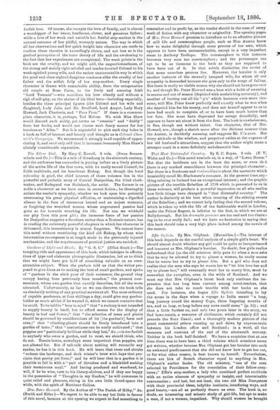The Silver Dial. By Mary C. Rowell. 3 vols. (Swan
Sonnen- schein and Co.)—This is a tale of Strasburg in the sixteenth century, and the authoress has succeeded in putting before us a lively picture of the active life of the free town, with its easily moved Council, its fickle multitude, and its beneficent Bishop. But though the local colouring is good, the chief interest of these volumes lies in the powerful and pathetic story of Conrad Dasipodins, the blind clock. maker, and Radegund von Steinbach, the artist. The former is as noble a character as we have seen in recent fiction ; he thoroughly enlists the reader's sympathy, whether we look upon him patiently overcoming his great physical affliction, or maintaining a dignified silence in the face of rancorous hatred and an unjust sentence, or forgiving the wretched woman whose ungoverned passion had gone so far towards wrecking his life. Nor can we withhold our pity from this poor girl ; the immense force of her passion for Dasipodius suggests a Southern rather than a Teutonic nature, bat in reading the extremely powerful chapters in which her character is delineated, this inconsistency is almost forgotten. We cannot leave this novel without mentioning the kind old Bishop, by whose wise intervention recompense is at length made to the grievously injured mechanician, and the requirements of poetical justice are satisfied.


































 Previous page
Previous page